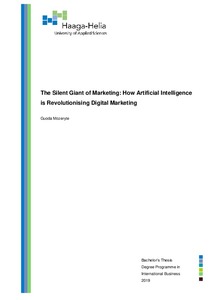The Silent Giant of Marketing: How Artificial Intelligence is Revolutionising Digital Marketing
Mozeryte, Guoda (2019)
Mozeryte, Guoda
2019
All rights reserved. This publication is copyrighted. You may download, display and print it for Your own personal use. Commercial use is prohibited.
Julkaisun pysyvä osoite on
https://urn.fi/URN:NBN:fi:amk-2019052812728
https://urn.fi/URN:NBN:fi:amk-2019052812728
Tiivistelmä
Digital marketing is transforming all the time due to technological advancements. This qualitative study aims to determine impacts artificial intelligence brings to digital marketing. The researcher’s objective was to understand the opportunities and challenges artificial intelligence brings to marketers across the world.
The theoretical framework for this study was established around understanding the concept of artificial intelligence and the related theory. Machine learning was determined to be one of the core characteristics of artificial intelligence. To completely comprehend the repercussions of artificial intelligence in digital marketing, content marketing, social media marketing, e-mail marketing, and search engine optimisation were also examined.
The methodology of the study presents the thesis writing process as well as the methods used to gather the data. The data was analysed through qualitative research. Secondary data was collected by utilising desktop research. It included written and visual sources such as scientific articles, books, commercial texts, and video content. Primary data was gathered by conducting an interview with an author dealing with artificial intelligence. The key theme of the interview was to establish the effect of artificial intelligence technologies in digital marketing.
The gathered data was qualitatively analysed to make proper recommendations to marketing professionals. The main results indicated how organisations should approach artificial intelligence. Artificial intelligence tools were recommended for social media, search engine optimisation, e-mail marketing as well as content marketing. In addition, companies that are utilising artificial intelligence were mentioned to indicate the rise of technology being incorporated in digital marketing.
To conclude, the study specifies the ups and downs of artificial intelligence and aims to guide marketers to make better marketing decisions.
The theoretical framework for this study was established around understanding the concept of artificial intelligence and the related theory. Machine learning was determined to be one of the core characteristics of artificial intelligence. To completely comprehend the repercussions of artificial intelligence in digital marketing, content marketing, social media marketing, e-mail marketing, and search engine optimisation were also examined.
The methodology of the study presents the thesis writing process as well as the methods used to gather the data. The data was analysed through qualitative research. Secondary data was collected by utilising desktop research. It included written and visual sources such as scientific articles, books, commercial texts, and video content. Primary data was gathered by conducting an interview with an author dealing with artificial intelligence. The key theme of the interview was to establish the effect of artificial intelligence technologies in digital marketing.
The gathered data was qualitatively analysed to make proper recommendations to marketing professionals. The main results indicated how organisations should approach artificial intelligence. Artificial intelligence tools were recommended for social media, search engine optimisation, e-mail marketing as well as content marketing. In addition, companies that are utilising artificial intelligence were mentioned to indicate the rise of technology being incorporated in digital marketing.
To conclude, the study specifies the ups and downs of artificial intelligence and aims to guide marketers to make better marketing decisions.
